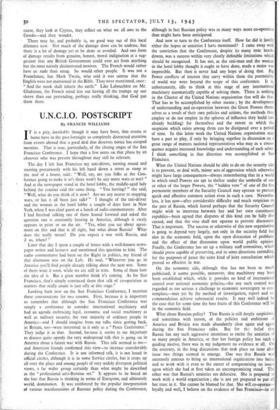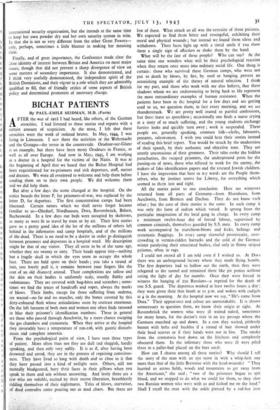U.N.C.I.O. POSTSCRIPT
By FRANCIS WILLIAMS
IT is a pity, inevitable though it may have been, that events at home have in the past fortnight so completely distracted attention from events abroad that a good deal that deserves notice has escaped mention. That is true, particularly, of the closing stages of the San Francisco Conference. I hope that a few notes on that phase by an observer who was present throughout may still be relevant.
The day I left San Francisco my taxi-driver, turning round and steering precariously with his left hand down a street as steep as the roof of a house, said : " Well, say, are you folks at the Con- ference going to make it so's there won't be any more wars or not? " And at the newspaper stand in the hotel lobby, the middle-aged lady behind the counter said the same thing. " You leaving? " she said, " Well, what do you think of it now? Are we any nearer to stopping wars, or has it all been just talk? " I thought of the taxi-driver and the woman in the hotel lobby a couple of days later in New York, when I was chief guest at a lunch of radio commentators. After I had finished talking one of them leaned forward and asked the question one is constantly hearing in America, although it rarely appears in print or on the air. " Yes, what you say about agree- ment on this and that is all right, but what about Russia? What does she really mean? Do you expect a war with Russia, and if so, when? "
Later that day I spent a couple of hours with a well-known news- paper writer and lecturer and mentioned this question to him. The radio commentator had been on the Right in politics, my friend of that afternoon was on the Left. He said, " Wherever you go in America you'll find people already talking about the next war. Some of them want it soon, while we are still in trim. Some of them hate the idea of it. But a great number think it's coming. As for San Francisco, that's simply convinced them that talk of co-operation in matters that really count is just silly at this stage."
Looking back now on the San Francisco Conference, I mention these conversations for two reasons. First, because it is important to remember that although the San Francisco Conference was simply a conference to consider international machinery and had an agenda embracing legal, economic and social machinery as well as military security, the vast majority of ordinary people in America—and I should imagine from my talks since getting back, in Britain, too—were interested in it only as a " Peace Conference." They judge it as that. Second, because it seems to me important to discuss quite openly the very widespread talk that is going on in America about a future war with Russia. This talk seemed to me— and American friends confirmed this view—to increase considerably during the Conference. It is not informed talk, it is not heard in official circles, although it is in some Service circles, but it crops up all over the place and among people of very widely divergent political views, a far wider group certainly than what might be described as the " professional anti-Russian set." It appears to be based on the fear that Russia is thinking in terms of European, and ultimately world, domination. It was reinforced by the popular interpretation of various manifestations of Russian policy during the Conference, although in fact Russian policy was in many ways more co-operative than might have been anticipated.
And now to turn to the Conference itself. How far did it justify either the hopes or anxieties I have mentioned? I came away with the conviction that the Conference, despite its many near break- downs, was a success within very clearly definable limitations which should be recognised. It has not, as the taxi-man and the woman in the hotel lobby thought it ought to have done, made a major war impossible. But then it never had any hope of doing that. Big Power conflicts -of interest that carry within them -the potentiality of world war were beyond the scope of this conference. It is, unfortunately, idle to think at this stage of any international machinery automatically capable of solving them. There is nothing in the Charter of the United Nations organisation that will do that. That has to be accomplished by other means ; by the development of understanding and co-operation between the Great Powers them- selves as a result of their own policies and actions, the methods they employ or do not employ in the spheres of influence they build (are already building) for themselves and the extent to which the suspicion which exists among them can be dissipated over a period of time. In this latter work the United Nations organisation may have a part to play, if only by bringing together in discussion on a great range of matters national representatives who may as a conse- quence acquire increased knowledge and understanding of each other. I think something in that direction was accomplished at San Francisco.
What the United Nations should be able to do on the security side is to prevent, or deal with, minor acts of aggression which otherwise might have large consequences—always remembering that in a world in which small Powers are apt to shelter under the umbrella of one or other of the larger Powers, the "hidden veto" of one of the five permanent members of the Security Council may operate to prevent quick and effective common action even in such a case. Neverthe- less, it has now—after considerable difficulty and much suspicion on the part of Russia, which feared perhaps that the Security Council might wish to intervene between her and 'her own constituent republics—been agreed that disputes of this kind can be fully dis- cussed, and that the veto shall not operate to prevent discussion. That is important. The success or otherwise of this new organisation is going to depend very largely, not only in the security field but also in the economic field, upon the open discussion of problems and the effect of that discussion upon world public opinion. Finally, the Conference has set up a military staff committee, which should prove capable of preserving, and in some directions extending, for the purposes of peace the same kind of joint consultation which proved so effective in war.
On the economic side, although that has not been so much publicised, it seems possible, moreover, that machinery may have been established which, while it provides no kind of international control over national economic policies,—for any such control was regarded as too serious a challenge to economic sovereignty to con- template,—may yet by the method of investigation, report and re- commendation achieve substantial results. It may well indeed be the case that for some time the best fruits of this Conference will be in the economic field.
What about Russian policy? That Russia is still deeply suspicious, and sometimes with reason, of the policies and ambitions of America and Britain was made abundantly clear again and again during the San Francisco talks. But for the belief that Russia has any such aggressive intentions as excite the anxieties of so many people in America, or that her foreign policy has such a guiding motive, there was in my judgement no evidence at all. On the contrary, in the long discussions that took place on issue after issue two things seemed to emerge. One was that Russia was extremely anxious to bring an international organisation into being and to work with it even to the extent of compromising on issues upon which she had at first taken an uncompromising stand. The other was that Russia's anxieties are defensive. She is prepared to work with a world organisation ; she is not yet prepared to put all her trust in it. She cannot be blamed for that. She will co-operate— loyally and well, I believe on the evidence of San Francisco—in an
international security organisation, but she intends at the same time to keep her own powder dry and her own security system in trim. In that she is not so very different from the other Great Powers— only, perhaps, sometimes a little blunter in making her meaning clear.
Finally, and of great importance, the Conference made. clear the Jose identity of interest between Britain and America on most major issues, though that did not prevent a sharp divergence of view on some matters of secondary importance. It also demonstrated, and I think very usefully demonstrated, the independent spirit of the British Dominions, and their vigour in a role which they are admirably qualified to fill, that of friendly critics of some aspects of British policy and determined promoters of necessary change.



























 Previous page
Previous page